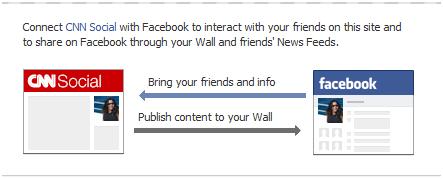 The controversy around Facebook’s announcements at the recent f8 developer conference has kicked into high gear, as first lawmakers and now consumer groups weigh in on the privacy implications of the social networking giant’s recent moves.
The controversy around Facebook’s announcements at the recent f8 developer conference has kicked into high gear, as first lawmakers and now consumer groups weigh in on the privacy implications of the social networking giant’s recent moves.
GigaOM reports that over 15 consumer groups have now filed complaints with the Federal Trade Commission to to protest the unauthorized sharing of private information by the social networking Goliath.
Epic.org, one of the organizations that has filed the complaint has described gist of the complaint,
“…that Facebook has engaged in unfair and deceptive trade practices in violation of consumer protection law. The complaint states that changes to user profile information and the disclosure of user data to third parties without consent “violate user expectations, diminish user privacy, and contradict Facebook’s own representations.””
At the heart of this firestorm is the “instant personalization” option that auto-opts in Facebook users into sharing their social graph with a few partners selected by Facebook, which according to GigaOM are Microsoft’s Docs.com, Yelp and Pandora.
The Facebook experience has been described by some as bland and homogenized but the user response to these changes has been anything but unanimous. The responses vary from highly contentious to generally apathetic, depending on which of the following 5 categories, the user belongs to.
#1 Blissfully Ignorant users that belong to the “I Don’t Know, Don’t Care” group.
This group includes otherwise perfectly smart people, who have bought into the myth perpetuated by Facebook that all conversations on the site are “private” or “between friends”. This group doesn’t get what the fuss is all about and doesn’t have a point of view on the privacy debate. This group of users doesn’t care enough to educate itself because it firmly believes that the benefits of sharing far outweigh the costs/consequences from lack of privacy.
#2 The Pragmatists from “I Know, but Don’t Care” group.
I’ve come across scores of users who belong to this group and my friend, Dennis is one of them. He says,
“If I wanted privacy, I wouldn’t be sharing my information online. I know the information I share on Facebook is not private and I don’t care. Facebook is convenient and free, that’s all that matters to me.”
Those who belong to this segment don’t mind sharing information as long as they get something in return. Many within this group know better than to share anything personal or don’t think they have much to lose from the information they do share. This group is willing to give up their privacy in return for some perceived value so you probably won’t hear them complaining much or at all.
#3 This is a very familiar group – the Opportunists that are mostly concerned with “What’s in it for me?”
This user segment has the most to gain from this forced openness and probably the least to lose. This group includes businesses, news media, developers, celebrities, artists, and anyone who has a vested interest in seeing the users profile information being shared broadly and want to see their own social graph being indexed in search.
#4 Ambivalents or the “I Know but Not Sure if I Should Care” is the group that’s still on the fence.
This group may be a larger majority than some might suspect and has mixed feelings about the whole privacy debate. These users will take their cue from the “experts” and the lawmakers to determine the full implications of the Facebook changes. You can call this group, Facebook’s “swing constituency”, the one that can go either way and spell success or defeat for Facebook in this privacy debate.
#5 Last but not the least, the Activists belong to the “Keep Your Mittens off my Social Graph (and my privacy settings)” group.
This group is probably Facebook’s fiercest and most vocal critic. The users from this group wants choices, and want to ensure that users are aware of consequences of their decision so they can make an informed decision. I believe that the online world is a safer (if not better) place because of this group’s diligence because it forces sites like Facebook to think twice before forcing “openness” on the users. This is the group seems to be increasingly concerned with Facebook’s quest to dominate/control all social data. This group will not willingly give up the social graph debate without a fight and is likely to become part of advocacy groups that want to prevent any one site’s dominance of the web, especially Facebook.
Depending on which group you belong to, you may think Facebook’s move to a more “open social web” is the greatest gift to the online world or it’s a pact with the devil himself. Facebook’s model is based on users being open and sharing all their personal information, but this aggressive push for openness may backfire in ways that Facebook didn’t imagine.

Even, as I was opting out of the “personalization” option, the “are you sure” confirmation message was very clear in that, even if I opt out, my friends could share my “public” information to “enhance” their experience. Apparently, the only way to truly and completely opt out of sharing your social data on Facebook is to block all applications and/ore start ditching your “over-sharing” friends.



